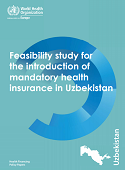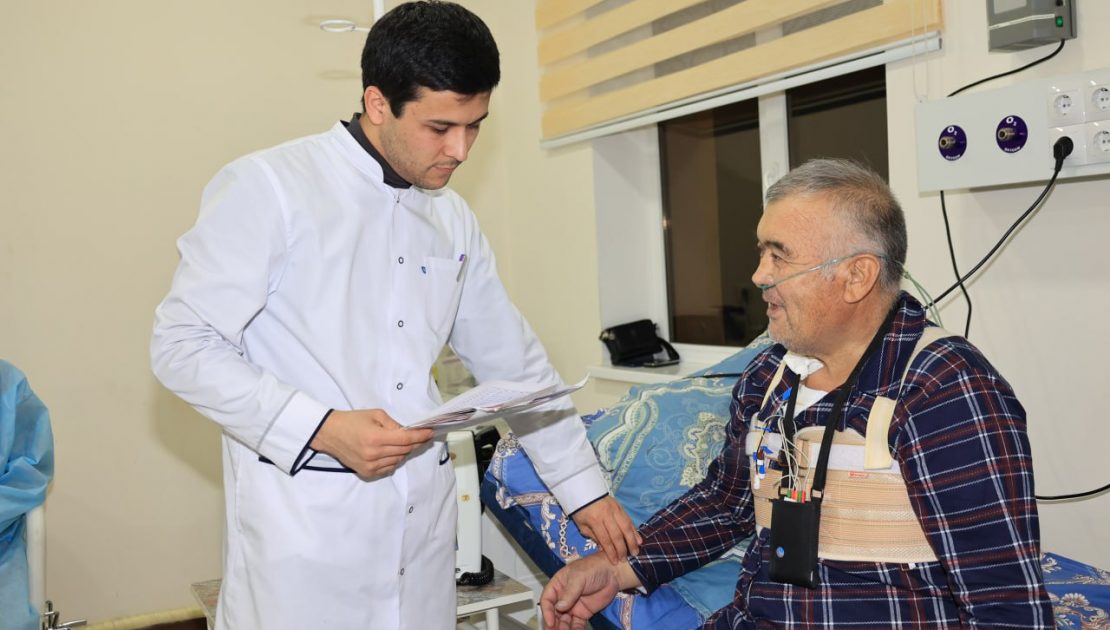To improve its health system, WHO reports that Uzbekistan is currently implementing a transformative reform programme. As many other countries within the Commonwealth of Independent States, Uzbekistan has decided to introduce mandatory health insurance (MHI) to move towards universal health coverage. The Concept of Health System Reform of the Republic of Uzbekistan, approved by Presidential Decree No. 5590 in December 2018 (the Decree), presents a central policy area to introduce mandatory health insurance (MHI) to ensure full population coverage of essential health services and pharmaceuticals.
The Decree also stipulates the need for a technical feasibility study to assess the funding mix options of the proposed MHI. The discussion about options is a response to the stated aspiration in the Concept to expand fiscal space for health, including through increased public financing.
As a result of a collaborative effort by the Government of Uzbekistan and WHO (Country Office in Uzbekistan and WHO Barcelona Office) a feasibility for the introduction of mandatory health insurance in Uzbekistan was conducted in 2019 and published in 2021. This feasibility study assesses the impact of potential revenue sources to expand the fiscal space for health under MHI. Using population, employment and economic data, it projects three scenarios of the potential public revenue mix for health.
According to its authors, this study is based on reflections of the potential impact of alternative revenue sources to advance the following four economic, social and health policy objectives:
1. Support progress towards universal health coverage.
2. Generate additional revenues for the health system in accordance with the indicators set by the Concept.
3. Be consistent with other policy documents, including those on tax evolution and employment.
4. Impact favourably on the labour market.
Three scenarios have been established to frame revenue projections for health up to 2025.
In the first (baseline) scenario, general taxation continues to be the sole base of public funding, with government funding increasing from its current 2.9% to 5% of gross domestic product by 2025.
The second scenario builds on financial resources that can potentially become available from 2021 with the introduction of a hypothetical 2% payroll tax contribution levied on the salary bill, plus a fixed contribution rate from individual entrepreneurs and continued allocation of general taxes from the state budget.
The third scenario has the same construction as scenario 2, but with contribution rates twice as high, providing higher potential revenue. Scenarios 2 and 3 have potential negative consequences for the labour market built into the projections.
In all three scenarios, projections for government health spending show large increases in available resources for health; this is due to the expected increase in the percentage of general taxes allocated to health, regardless of whether an earmarked payroll tax is introduced. These results are driven by the stipulation in the Presidential Decree to increase government health funding to introduce MHI.
In 2025, the projected available public funding for health is 620 000 som per capita from general government budget resources (scenario 1). The additional revenue for health from a payroll-based contribution is projected to be 35 000 som per capita in the scenario with a 2% salary-based contribution rate, and 52 000 som per capita in the scenario with a 4% contribution rate. The share of the payroll tax in the total public funding mix in 2025 would be 5.4% and 7.7% respectively.
There are considerable fiscal and labour market risks with introducing a new payroll tax. Uzbekistan has low unemployment but has seen formal employment numbers decrease in recent years. The 2019 income tax and social security contribution reform is designed to enhance economic growth by increasing the formal labour force participation through lowering taxes on salaries. The new income tax scale is simplified, reduces labour costs and, more significantly, removes disincentives for qualified staff to register income. An earmarked payroll tax for health is inconsistent with this recent tax reform.
The feasibility study concludes that:
- general taxation offers the most effective way to pool funds and risks, to redistribute resources in an equitable manner and to support progress towards universal health coverage;
- the additional resources generated by a compulsory payroll contribution are limited and would not substantially increase the ability to fund MHI beyond what budget resources collected through general taxation can do;
- introducing a payroll tax would be inconsistent with the objectives of the 2019 income tax and social security contribution reform;
- introducing a payroll tax risks harming the labour market and the overall fiscal situation, and must be seen in a broader public finance and economic growth perspective.
The feasibility study recommends to:
- expand reliance on general taxation within an agreed medium-term budget framework to ensure predictability and not introduce the payroll tax;
- seek complementary financial resources for health by developing health-promoting tax policies for undesirable and environmentally costly consumption, such as tobacco, alcohol and fossil fuels; and
- focus on efficiency gains in the service delivery system to expand fiscal space by introducing modern clinical and professional managerial practices underpinned by strong digitalization and performance monitoring to use limited resources more efficiently.
The study concludes that general taxation offers the most effective way to support progress towards universal health coverage, and a payroll tax would generate limited additional resources, be inconsistent with the objectives of the 2019 income tax and social security contribution reform, and risk harming the labour market. It is noted that Uzbekistan can seek complementary revenue streams from alternatives (e.g. sin taxes), and further expand fiscal space for health through focusing on efficiency gains in the service delivery system.
The study was presented and discussed at a high-level policy dialogue in Tashkent, Uzbekistan, on 25– 26 April, 2019, where stakeholders contributed with presentations and comments.
Source:



